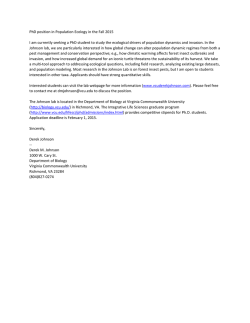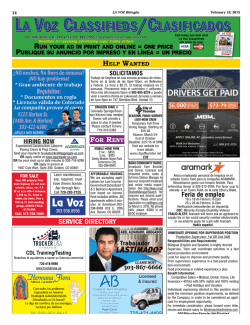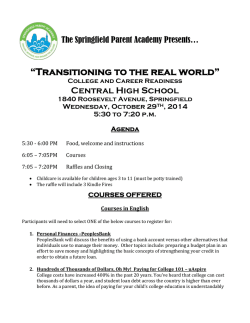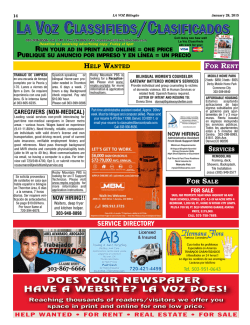
SETI 400-901 SPANISH-ENGLISH COMPARATIVE
SETI 400-901 SPANISH-ENGLISH COMPARATIVE GRAMMAR FALL 2015 School of World Studies Virginia Commonwealth University Instructor: Marilyn Blake, [email protected] Location: Hibbs Hall, Rm. 0260 Class Schedule: M,W 4:00 – 5:15 p.m. Office: Lafayette Hall, Rm. 307 DESCRIPCIÓN DEL CURSO: Tomar “Español 401” es uno de los requisitos para el programa SETI (Spanish-English Translation and Interpretation) “Estructuras comparadas” le ofrece a Ud. la oportunidad de mejorar su estudio del idioma español, empleando un modo comparativo con el inglés. Se espera que cada alumn@ posee una base gramatical sólida de las dos lenguas. El/la estudiante debe tener un buen entendimiento de los verbos, tanto sus tiempos como la terminaciones. El/La profe se reserva el derecho de exigirle práctica adicional o un cambio de curso de cualquier estudiante que no sea suficientemente capacitad@ para este nivel avanzado. Vamos a desarrollar nuestras capacidades de hablar español de un modo oral a través de participación en la clase tanto como con presentaciones orales. También vamos a mejorar nuestra comunicación escrita a través de ejercicios, ensayos, y traducciones. TEXTOS: 1. Un buen diccionario bilingüe. El/la profe recomienda los grandes o avanzados diccionarios de los editoriales Larousse, Collins y Oxford (no los “concisos”, “de bosillo” o “pocket”). En la lista de “Enlaces externos” de Blackboard se encuentran varios diccionarios del Internet. 2. Whitley, Melvin Stanley. Spanish/English Contrasts: A Course in Spanish Linguistics. Washington, D.C.: Georgetown University Press, 2002. La edición antigua de nuestro libro en la biblioteca Cabell: http://catalog.library.vcu.edu/F/?func=find-‐b-‐0 3. Butt, John and Carmen Benjamin. A New Reference Grammar of Modern Spanish. 4th ed. London: Hodder Education, 2004. REQUISITOS DEL CURSO: Asistencia y participación: La asistencia a clase es fundamental y su falta tendrá varias consecuencias negativas. Dado el carácter colectivo y participativo de la clase, las ausencias afectarán de forma adversa la calidad del aprendizaje tanto para el individuo como para el grupo. Habrá una reducción en la calificación final por cualquier ausencia no excusada. Más de tres ausencias resultarán en una F, según las pautas de SWS. Llegar tarde a la clase tres veces cuenta como una ausencia; favor de llegar temprano al aula. Las excepciones a esta política serán la observación de los días festivos religiosos, la participación en otros eventos sancionados por la universidad y emergencias confirmadas por la decana o el decano de la universidad. Si esta clase queda demasiado lejos para que el/la estudiante pueda llegar a tiempo, hay que arreglar el horario cuanto antes. Para leer sobre la posición de VCU referente a las ausencias: http://www.has.vcu.edu/wld/academic-‐advising/attendance.html Recuperaciones: Ningún/a estudiante podrá tomar un examen (o entregar tarea, dar una presentación, etc.) antes o después de la fecha asignada si es por una ausencia injustificada. NO SE ACEPTA TAREA ENTREGADA TARDE. La tarea entregada en clase no se aceptará por correo electrónico. Désela a un/a amigo/a o compañero/a para llevarla a clase. Se le pide a un/a compañer@ de la clase – NO al/a la profe – la materia estudiada el día de cualquier ausencia. En el caso de que la ausencia sea justificada y probada con documentación (hospitalización, fallecimiento de un/a pariente, etc.), el/la profe junto con el/la estudiante decidirán una fecha apropiada para recuperar el trabajo asignado cuanto antes. Tarea: La tarea consistirá en varios ejercicios del libro (escritos A DOBLE ESPACIO a máquina en una hoja de papel para entregar). Se entregan el día de la lectura correspondiente. También, la tarea incluirá otros ejercicios asignados por el/la profe. Prepare toda la tarea para el día indicado en el programa ANTES DE VENIR A CLASE. Si tiene que dejar algo en el buzón del/de la profe por cualquier razón en una fecha ya acordada, hay que entregarlo antes del mediodía. Si es un trabajo con varios borradores, hay que tener todos los borradores junto con la copia actual. Si no, se pierde puntos. Esto se aplica a todos los deberes escritos, los cuales van a estar redactados. Pruebas: Las pruebas enfatizan la importancia de absorber la materia del curso. Habrá la posibilidad de pruebas no anunciadas en clase en cualquier momento. Venga preparad@ a clase. Exámenes: Habrá varios exámenes escritos basados en las lecturas, ejercicios y conversaciones de la clase. La fecha para el examen final: ______________________________________ SISTEMA DE CALIFICACIÓN: La calificación final se calculará a través de un sistema de puntos. Todo que el/la estudiante hace para una nota, llevará consigo un valor de puntos. La califacción final resultará con los porcientos así: Ejercicios de tarea 10% Exámenes/Pruebitas 50% Composiciones 20% Examen Final 20% Grading Scale (VCU – La Norma) A = 90% -‐ 100% B = 80% -‐ 89% C = 70% -‐ 79% D = 60% -‐ 69% F = 59% o menos CÓDIGO DE HONOR: Los alumnos son responsables por su trabajo y tienen la obligación sincera de evitar todo plagio, que el Diccionario General de la Lengua Española Vox define así: El acto de “copiar en lo sustancial [ideas, palabras, obras, etc., de un/a autor/a], dándolas como propias”. Cualquier préstamo intelectual debe ir acompañado por una cita para dar el crédito debido. El código se aplica a todos los aspectos del curso. **En esta clase, si se entera el/la profe que un/una estudiante ha utilizado un programa traductor, como Google Translate o Babelfish, resultará en una “F” para el curso entero. No los use. Pide ayuda al/a la profe, a los compañeros de clase, a otros profes, a un montón de libros de referencia. Nunca use esos programas. COMPORTAMIENTO: Unas reglas que mejorarán su experiencia en el curso: 1) Favor de no comer ni beber en clase, salvo botellas con tapa. La comida se come antes o después de la clase. 2) Favor de no masticar chicle. 3) Favor de llegar a tiempo y no salir temprano para evitar distraer a los demás. 4) Favor de silenciar los teléfonos celulares y apagar otro equipo portátil. El uso de computadoras portátiles se dará sólo con el permiso de la profesora/del profesor. 5) Favor de dejar de mandar/recibir textos. Si se entera la/el profe que un/una estudiante está involucrado/a en el mando or recibo de los textos, lo notará. Al llegar la tercera vez, afectará la calificación final con la perdida de diez puntos de la calificación final, o sea, a lo mejor, una letra. AHORA EN INGLÉS: Important Dates Important dates for the Fall 2014 semester are available at: http://academiccalendars.vcu.edu/ac_fullViewAll.asp?term=Fall+2014 Class Registration Required for Attendance Students may attend only those classes for which they have registered. Faculty may not add students to class rosters or to Blackboard. Therefore, if students are attending a class for which they have not registered, they must stop attending. Withdrawal from Classes Before withdrawing from classes, students should consult their instructor as well as other appropriate university offices. Withdrawing from classes may negatively impact a student’s financial aid award and his or her semester charges. To discuss financial aid and the student bill, visit the Student Services Center at 1015 Harris Hall or contact a financial aid counselor at http://www.enrollment.vcu.edu/finaid/contact.html If you do decide to withdraw from this class, and have hold on your account, you will not be able to withdraw electronically. In this case, you will need to go to the Student Service Center of Records & Registration, ground floor of Harris Hall, in order to withdraw. IMPORTANT: Last day to withdraw with the grade of “W” during Fall 2014: Friday, October 31. E-mail Policy Electronic mail or "e-‐mail" is considered an official method for communication at VCU because it delivers information in a convenient, timely, cost effective and environmentally aware manner. Students are expected to check their official VCU e-mail on a frequent and consistent basis in order to remain informed of university-‐related communications. The university recommends checking e-‐mail daily. Students are responsible for the consequences of not reading, in a timely fashion, university-‐related communications sent to their official VCU student e-‐mail account. This policy ensures that all students have access to this important form of communication. It ensures students can be reached through a standardized channel by faculty and other staff of the university as needed. Mail sent to the VCU e-‐mail address may include notification of university-‐related actions, including disciplinary action. Please read the policy in its entirety: http://www.ts.vcu.edu/kb/3407.html VCU Honor System: Upholding Academic Integrity The VCU Honor System policy describes the responsibilities of students, faculty and administration in upholding academic integrity, while at the same time respecting the rights of individuals to the due process offered by administrative hearings and appeals. According to this policy, "Members of the academic community are required to conduct themselves in accordance with the highest standards of academic honesty and integrity." In addition, "All members of the VCU community are presumed to have an understanding of the VCU Honor System and are required to: • Agree to be bound by the Honor System policy and its procedures; • Report suspicion or knowledge of possible violations of the Honor System; • Support an environment that reflects a commitment to academic integrity; • Answer truthfully when called upon to do so regarding Honor System cases, and, • Maintain confidentiality regarding specific information in Honor System cases.” The Honor System in its entirety can be reviewed on the Web at http://www.assurance.vcu.edu/Policy%20Library/VCU%20Honor%20System.pdf. More information can also be found on the Division of Student Affairs website at http://www.students.vcu.edu/studentconduct/students/student_honor_system.html Student Financial Responsibility Students assume the responsibility of full payment of tuition and fees generated from their registration and all charges for housing and dining services, and other applicable miscellaneous charges. Student Conduct in the Classroom According to the Faculty Guide to Student Conduct in Instructional Settings (http://www.assurance.vcu.edu/Policy%20Library/Faculty%20Guide%20to%20Student %20Conduct%20in%20Instructional%20Settings.pdf), "The university is a community of learners. Students, as well as faculty, have a responsibility for creating and maintaining an environment that supports effective instruction. In order for faculty members (including graduate teaching assistants) to provide and students to receive effective instruction in classrooms, laboratories, studios, online courses, and other learning areas, the university expects students to conduct themselves in an orderly and cooperative manner." Among other things, cell phones and beepers should be turned off while in the classroom. Also, the university Rules and Procedures prohibit anyone from having "in his possession any firearm, other weapon, or explosive, regardless of whether a license to possess the same has been issued, without the written authorization of the President of the university..." For more information, visit the VCU Insider online at https://docs.google.com/a/vcu.edu/file/d/0B7z3ZniSHWXVU1ZmcFpIQ1J2UXM/edit?pli= 1. Students with Disabilities SECTION 504 of the Rehabilitation Act of 1973 and the Americans with Disabilities Act of 1990 as amended require that VCU provides "academic adjustments " or "reasonable accommodations" to any student who has a physical or mental impairment that substantially limits a major life activity. To receive accommodations, students must request them by contacting the Disability Support Services Office on the Monroe Park Campus (828-‐2253) or the Division for Academic Success on the MCV campus (828-‐9782). More information is available at the Disability Support Services webpage: http://www.students.vcu.edu/dss/ or the Division for Academic Success webpage at www.specialservices.vcu.edu/disabilityss Any student who has a disability that requires an academic accommodation should schedule a meeting with the instructor at the student’s earliest convenience. Additionally, if coursework requires the student to work in a lab environment, the student should advise the instructor or a department chairperson of any concerns that the student may have regarding safety issues related to a disability. Students should follow this procedure for all courses in the academic semester. Excused Absences for Students Representing the University Students who represent the university (athletes and others) do not choose their schedules. Student athletes are required to attend games and/or meets. All student athletes should provide their schedule to the instructor at the beginning of the semester. The Intercollegiate Athletic Council strongly encourages faculty to treat missed classes or exams (because of a scheduling conflict) as excused absences and urges faculty to work with the students to make up the work or exam. VCU Mobile The VCU Mobile application is a valuable tool to get the latest VCU information on the go. The application contains helpful information including the VCU directory, events, course schedules, campus maps, athletics and general VCU news, emergency information, library resources, Blackboard and more. To download the application on your smart phone or for more information, please visit http://m.vcu.edu. Campus Emergency information What to Know and Do to Be Prepared for Emergencies at VCU: • Sign up to receive VCU text messaging alerts (http://www.vcu.edu/alert/notify). Keep your information up-‐to-‐date. Within the classroom, the professor will keep his or her phone on to receive any emergency transmissions. • Know the safe evacuation route from each of your classrooms. Emergency evacuation routes are posted in on-‐campus classrooms. • Listen for and follow instructions from VCU or other designated authorities. Within the classroom, follow your professor's instructions. • Know where to go for additional emergency information (http://www.vcu.edu/alert). • Know the emergency phone number for the VCU Police (828-‐1234). Report suspicious activities and objects. • Keep your permanent address and emergency contact information current in eServices. Statement on Military Short-Term Training or Deployment If military students receive orders for short-‐term training or deployment, they should inform and present their orders to Military Student Services and to their professor(s). For further information on policies and procedures contact Military Services at 828-‐5993 or access the corresponding policies at http://www.pubapps.vcu.edu/bulletins/about/?Default.aspx?uid=10096&iid=30704 GENERAL SYLLABUS BY CLASS: (with homework – basic outline) CLASS 1 Intro to class. Syllabus review. Animales ws/read ch 4/look dip/trip CLASS 2 Lang Basics/Diag test/animales 100 comp. accent perfect CLASS 3 Ch 4/Lang basics/accents peer edits/quiz-‐accents CLASS 4 Quiz/class activity/peer edit Ch 6-‐ 2/3/4/6/10/11, comp-‐ syntax 100 CLASS 5 Ch 6/irregular verbs pres: dipth/triph & acento/ex CLASS 6 Ch 6/class activity – tba comp 100 wds review a movi CLASS 7 TEST CH 4 & 6 Ch 7 #1,2 CLASS 8 Ch 7/class activity – translation in class Comp 150 use irregular verb CLASS 9 Ch 7/uses of present tense CLASS 10 Lab assignment – assignment tba CLASS 11 Quiz on ch 7 to date CLASS 12 Ch 7/aspect and tense/class activity -‐ writing in class CLASS 13 TEST/ aspect and tense CLASS 14 Ch. 7/Preterite and imperfect tenses CLASS 15 Ch 7/Preterite and imperfect tenses CLASS 16 TEST/Preterite and imperfect tenses CLASS 17 TBA CLASS 18 ORAL EXAM presenttions CLASS 19 ORAL EXAM/Ch. 7/subjunctive CLASS 20 Ch 7/subjunctive CLASS 21 Ch 7/subjunctive/class activity – document translation presentar el sistema presente CLASS 22 TEST/Ch 7/subjunctive CLASS 23 Modales CLASS 24 Modales/class activity -‐ tba CLASS 25 TBA CLASS 26 Ch 9/pronouns CLASS 27 Ch 9/pronouns CLASS 28 TEST/pronouns Final Exam ______________________ (Oral portion of exam to be done in lab) • No class September 1 and November 26.
© Copyright 2026



